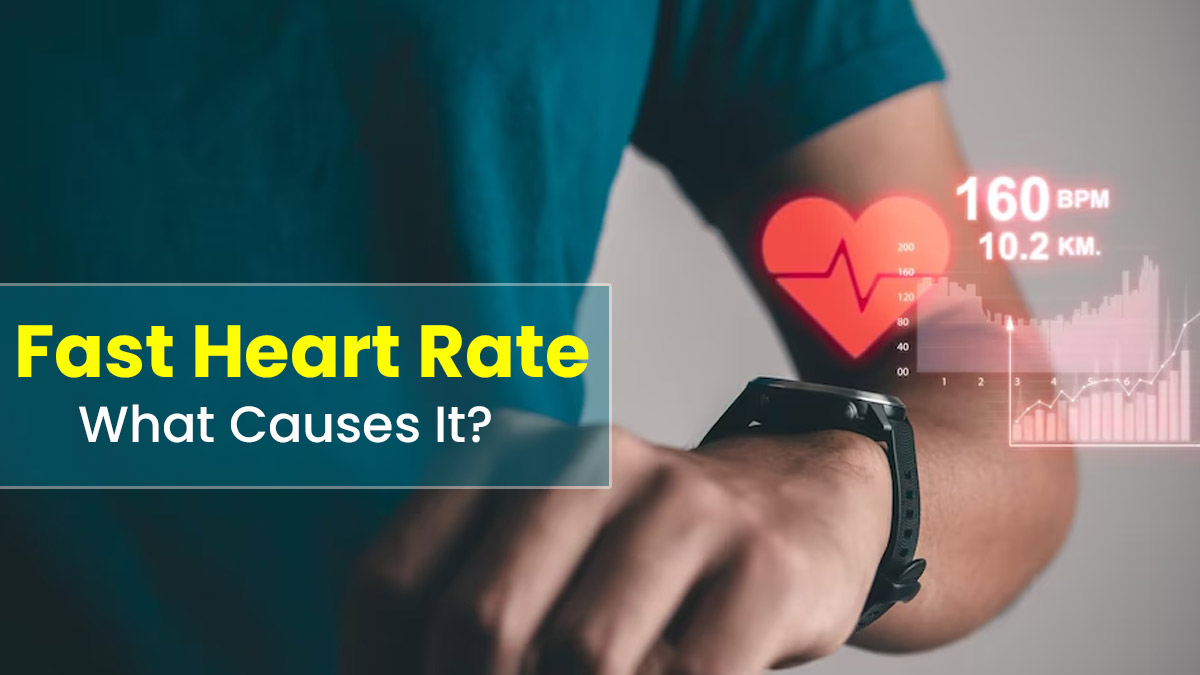
A fast heart rate, or tachycardia, can be accompanied by several sensations like a racing, pounding heartbeat or palpitations, you may experience chest pain, a rapid pulse rate, shortness of breath or even feel lightheaded. But do you know when and why it occurs?
Table of Content:-
Speaking with the OnlyMyHealth team, Dr Vivek Mahajan, Consultant Interventional Cardiologist, Fortis Hospital, Kalyan, not only explains what a normal heart rate should be, but also shares the triggers of a fast heart rate.
Also Read: What Does It Mean To Have A Healthy Heart Rate? Expert Answers
What Comprises A Healthy Heart Rate

Ideally, a heart rate of 60-100 beats per minute (bpm) is considered as a normal or a healthy heart rate, says Dr Mahajan, adding that patients who have a lower heart rate towards 60 or 70 bpm have a better life span as compared to patients who have a higher heart rate between 80-100 bpm.
According to him, higher heart rates may result in damage to the heart muscles, making them weaker and therefore, it is essential to maintain the heart rate lower around 60-70 bpm, or at least below 80.
What Causes A Fast Heart Rate Or Tachycardia?
The American Heart Association (AHA) defines tachycardia as a heart rate of more than 100 bpm.
Dr Mahajan explains, “The heart rate of humans is increased by a system, which is called the sympathetic nervous system from the brain. There are a number of nerve connections to the heart and these secrete certain chemicals which are like epinephrine or noradrenaline. When they increase in quantity, the heart rate can also increase simultaneously.”
“The sympathetic nervous system gets activated in stressful situations like fear, anxiety or excitement, and this can lead to an increased heart rate,” she notes, further adding that regular exercise can help lower heart rate and strengthen a counter system, which is called the parasympathetic nervous system or the vagal system.”

As per research, the parasympathetic nervous system prevails in quiet “rest and digest” conditions, whereas the sympathetic nervous system contributes to a “fight or flight” response in stressful situations.
Those who exercise have a lower heart rate because their parasympathetic nervous system becomes stronger and this counters the sympathetic nervous system. So, when the sympathetic nervous system increases the heart rate, the parasympathetic nervous system reduces the heart rate.
Also Read: Is Your Heart In Good Shape? 5 Important Tests That Can Tell You
Can Caffeine Raise Heart Rate?

Dr Mahajan says caffeine can lead to an increase in the sympathetic nervous system activity, which leads to circulation of hormones like adrenaline and noradrenaline in the body, increasing the heart rate.
Since the effect may last from 30 minutes to an even greater period of time, hence, the patient should not have consumed caffeine in the last 30-40 minutes when taking the blood pressure as both the blood pressure and the heart rate can increase because of the caffeinated drink.
When Is Fast Heart Rate Or Tachycardia Concerning?
A tachycardia or fast heart rate is usually harmless. However, you must consult a doctor if your resting heart rate is consistently above 100 bpm or if you're not a trained athlete and your resting heart rate is below 60 beats a minute, according to Mayo Clinic. In addition, if a fast heart rate occurs with shortness of breath, weakness, dizziness, lightheadedness, fainting, and chest pain, seek medical help immediately.
How we keep this article up to date:
We work with experts and keep a close eye on the latest in health and wellness. Whenever there is a new research or helpful information, we update our articles with accurate and useful advice.
Current Version